Care After Combat
Care after Combat were awarded £10,000 under the Force for Change programme in August 2022, to support Armed Forces Veterans that encounter the justice system.
Read MoreThis year’s Annual Report is available to read in full, and download, at the link below.
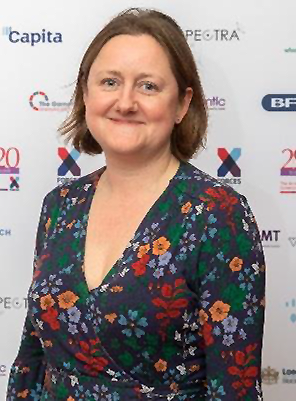
This year, we have effectively provided over £31 million through various targeted programmes, each designed to enhance the lives and futures of our Armed Forces families, Veterans and Service members. We launched impactful initiatives, such as the Veterans’ Career Development Fund OP PROSPER, to smooth the transition to civilian careers with tailored training and employment support.
We’ve demonstrated our commitment to inclusivity and addressing diverse needs through the LGBT Veterans Fund. This initiative supports projects like the groundbreaking ‘Voices of Valor’, which provides mental health services tailored specifically to LGBT Veterans, ensuring they receive the support they deserve in an affirming and respectful manner.
We also intensified our efforts to combat Veteran homelessness with the Reducing Veteran Homelessness Programme, allocating £7.2 million, on behalf of the Office for Veterans’ Affairs, to robust support networks that do more than offer housing—they rebuild lives by providing holistic support and pathways to employment.
The Transformational Grants Programme continued to drive systemic change, committing nearly £3 million to initiatives that enhance mental health, education and family support across the Armed Forces community. These projects are not just temporary fixes but building blocks for long-term, sustainable impact.
It has been an incredible privilege to serve as the inaugural Chair of the Armed Forces Covenant Fund Trust since 2015. I am so very proud of the work that the Trust executive has undertaken, with the support of our dedicated Trustees, and the huge impact that it has had in delivering the Covenant promise to the Armed Forces community. Since the Trust was established, we have considered nearly 8,000 applications and made over 4,000 awards totalling more than £128 million – all in support of our Armed Forces community.
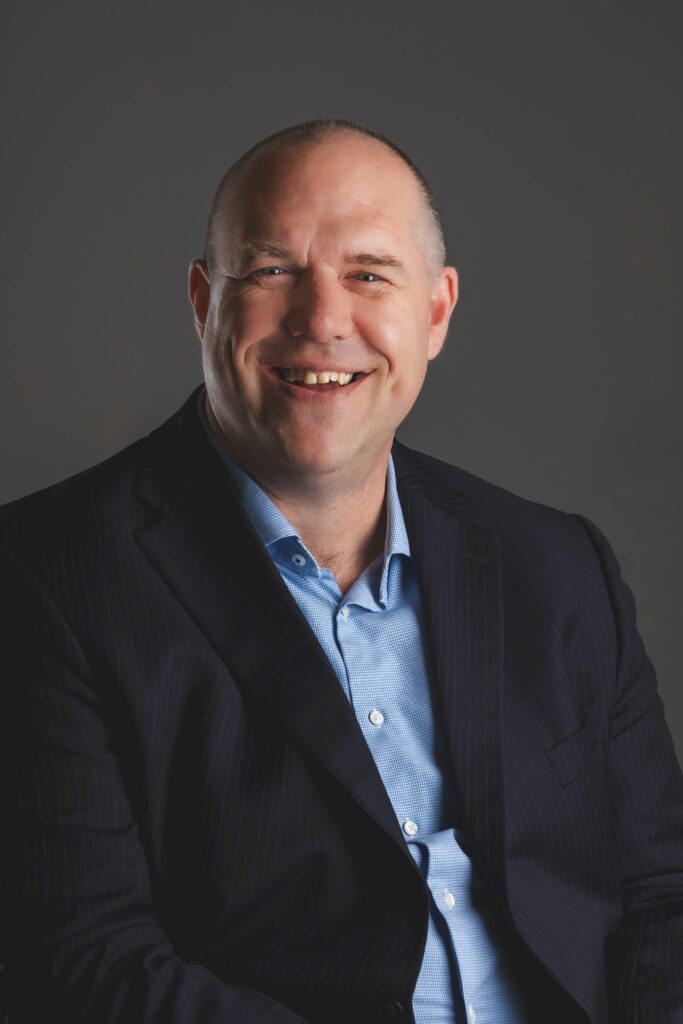
As I step into the role of Chair of the Armed Forces Covenant Fund Trust, I am deeply honoured and excited to contribute to our vital mission of supporting the Armed Forces community. This past year has been one of significant growth and a testament to the hard work and innovative spirit of our team, our partners, and the wider community we serve.
As we bid a heartfelt farewell to Helen Helliwell, I want to express my profound gratitude for her visionary leadership. Helen steered the Trust from its early days to the established and effective organisation it is today, setting a high standard of excellence and compassion. Her unwavering dedication has been pivotal to our success and leaves a legacy.
Looking forward, we are well positioned to build on these successes. Our recent major consultation will shape our strategic direction for the 2024-2027 funding cycle, ensuring that we continue to meet the evolving needs of our community with innovative and impactful solutions.
I am thrilled to lead the Trust into its next chapter. Together with our Chief Executive Anna Wright, our dedicated Trustees and passionate staff, we are committed to enhancing the support for the Armed Forces community, ensuring they receive the recognition and support they deserve.
Watch an overview of our year for 2023/24…
The Armed Forces Covenant Fund Trust is a grant making organisation that funds projects which support the delivery of the Nation’s Covenant promise to our Armed Forces, their families, and Veterans.
Our Vision is a thriving Armed Forces community that is valued and supported within our society. We are a charity and are classified as a Non-Departmental Public Body, or NDPB.
We look after the Armed Forces Covenant Fund, worth £10 million each year, and we work with HM Government to run other funding programmes that have a positive impact on Armed Forces communities. Our Mission, Vision and Values guide us in all we do.
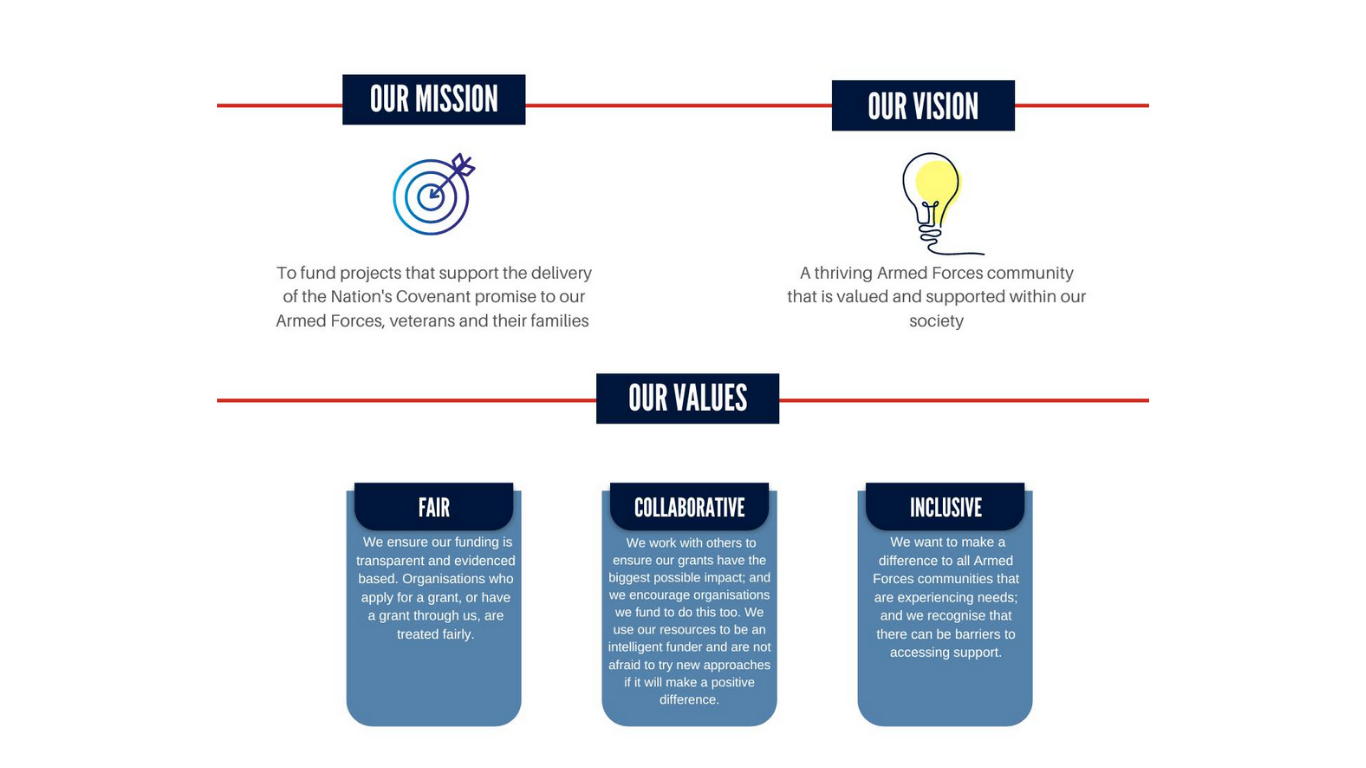
Integrity and fairness guide our grant making process. We provide clear and transparent guidelines for each of our funding programmes, which detail the assessment criteria for applications, ensuring all applicants understand what constitutes a strong proposal. Our experienced Grants Team evaluates each application with consistency, using standardised procedures to maintain fairness throughout the process.
“The Trust has made remarkable progress and has been open to new ideas, non-specialist AFC/Veteran organisations. Well done and thank you.”
– Consultation respondee
We partner with government agencies and charity organisations to co-create grant programmes that empower organisations to address significant challenges effectively. By funding projects that deliver clear and sustained benefits to Armed Forces communities, we not only meet immediate needs but also build capacity for lasting impact.
Additionally, we are committed to sharing insights and learning from our funded projects through our Knowledge Network, regular reporting and open webinars, fostering a community of practice that enriches all participants.
“Your funding is key and changed the lives of so many of the AF Community. Keep it up.”
– Consultation respondee
Our commitment to inclusivity shapes how we allocate resources. Through targeted funding programmes, each designed with a clear objective, we address pressing challenges faced by the Armed Forces community. We build these programmes upon robust evidence and aim to deliver transformative impacts, where they are most needed. To enhance these efforts, we offer comprehensive support to our awardees, including access to our Impact Hub for improved data collection, mentorship opportunities and digital platforms that facilitate knowledge sharing, problem-solving and collaborative learning.
“I have worked for two Armed Forces charities and the money received from the AFCF has been vital to the work of BOTH. Thank you.”
– Consultation respondee
We awarded £31,717,321 in 2023/24, through 311 grants.
In 2023/24, the Trust awarded grant funding in support of the Armed Forces community under seven distinct Funds.
In addition to making new grants under these Funds, we continued to manage between 700 and 900 live grants in grant management at any point in the year, under programmes including the Veterans’ Places, Pathways and People programme, the Supporting Armed Forces in Acute Hospital programme, the Afghanistan Veterans’ Fund and the One Is Too Many programme.

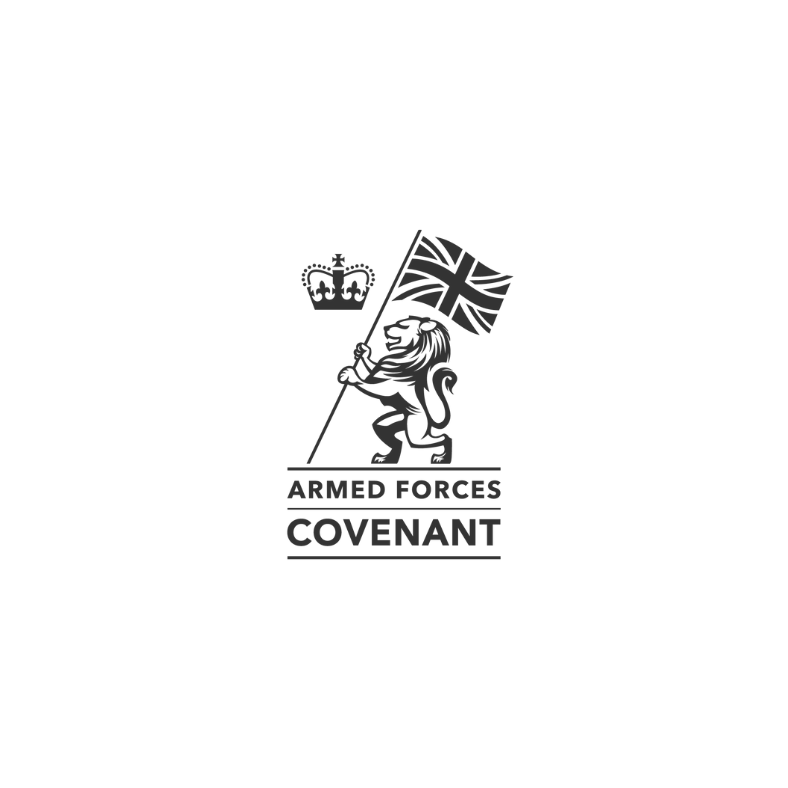
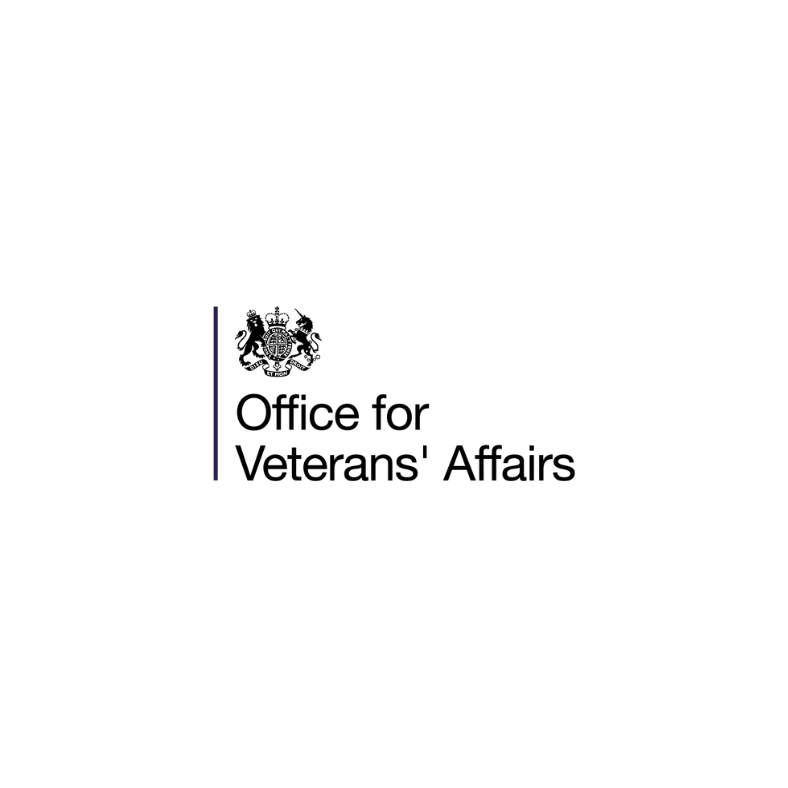
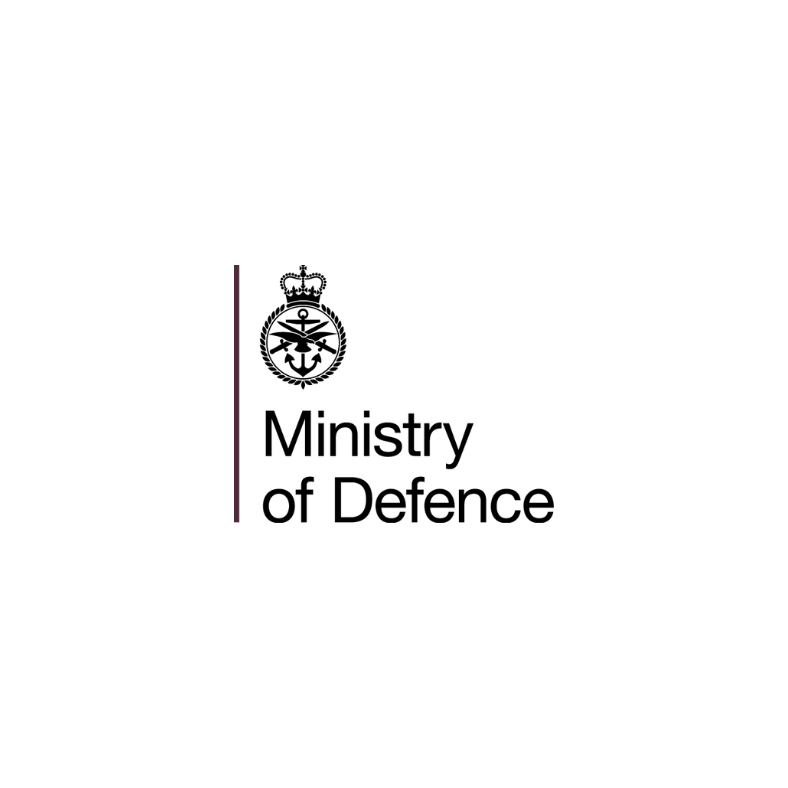
Click below to discover more about the projects we’ve supported thanks to each funder.
In 2023/24, the Trust continued to run three core funding programmes under the Armed Forces Covenant Fund. Each of these programmes have previously demonstrated positive impact, and the high numbers of applications received continued to highlight the need for this provision within the Armed Forces community.
This year, we increased the award amount under the Force for Change programme to up to £15,000 to reflect cost of living pressures. To further our learning about what is most important to the community, we undertook a consultation in summer 2023, to help design a Funding Framework for the next three years of the Covenant Fund. There is more on our consultation later in this report.
Click on an image to jump to a Covenant Fund programme…
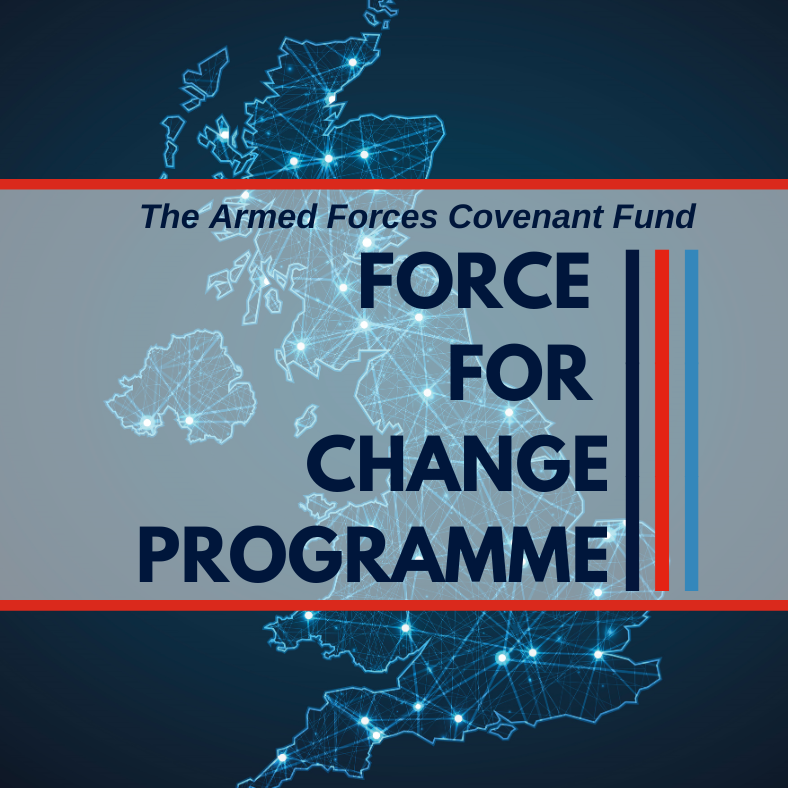

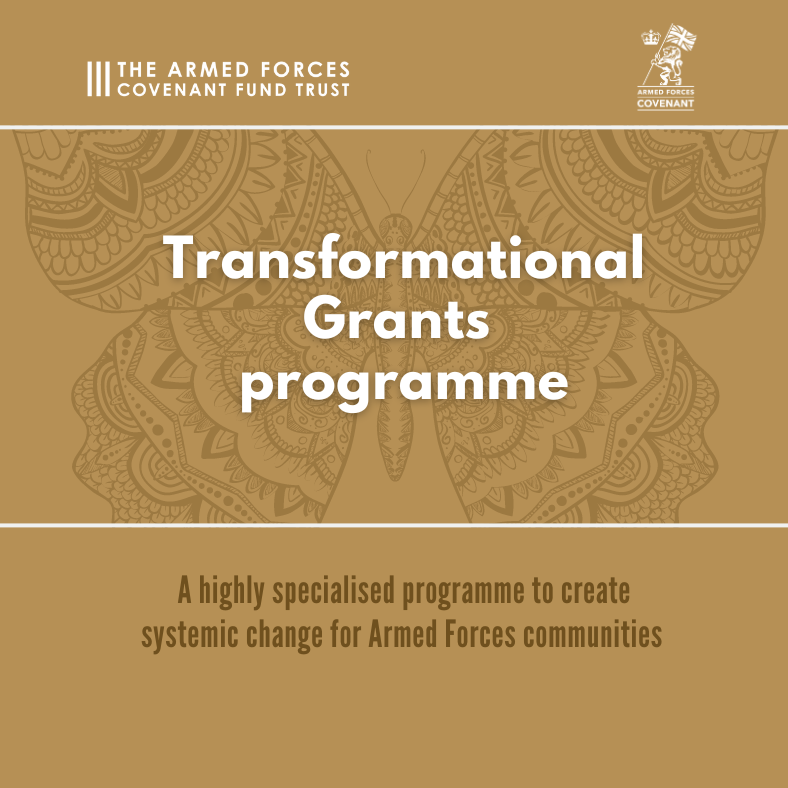
Our dynamic Force for Change programme has successfully awarded 76 grants this year, providing over £1 million to impactful initiatives supporting the Armed Forces community. This programme is dedicated to fostering innovation and addressing previously unmet needs, at community level.
In response to the cost-of-living crisis, we have prioritised projects that support the most vulnerable. These projects aim to tackle pressing issues such as isolation, complex needs and economic hardship. For example, the Royal Navy and Royal Marines Charity’s initiative, Bringing The Submarine Family Together, received a £15,000 grant to focus on reducing isolation and enhancing peer support, by organising events for partners of deployed Royal Navy submariners – particularly those without children or with grown children.
Aware of the ongoing challenges brought on by rising living costs, we remain unwavering in our commitment to support those most affected. We are dedicated to continuing our support through targeted funding that addresses ongoing economic pressures, ensuring our Armed Forces communities receive the necessary support to thrive.
Care after Combat were awarded £10,000 under the Force for Change programme in August 2022, to support Armed Forces Veterans that encounter the justice system.
Read MoreVoluntary Impact Northamptonshire received £9,623 under the Force for Change programme for their ‘Happy at Home’ befriending project.
Read MoreOutfit Moray were awarded £14,960 to implement an innovative outdoor learning and adventure programme for Service families.
Read MoreBlues and Royals Association secured a grant for £10,000 under the Force for Change programme to expand their popular ‘Walk+Talk’ initiative in the Northeast of England.
Read MoreFollowing on from the success of the Reaching and Supporting Armed Forces Communities programme last year, we awarded a further 63 grants totalling £5.7 million this year, to address hidden or complex needs and where evidence has highlighted gaps in support and provision.
This included an award of £100,000 to Combat Stress for their pioneering Suicide Prevention initiative. This crucial funding supports the development of specialist suicide prevention toolkits, available 24/7, designed to upskill those living with, working with, or caring for high-risk Veterans. By sharing their expertise with national networks and learning communities, Combat Stress is setting new standards in preventing suicide among Veterans facing the highest risks.
Since the programme first launched in April 2022, we have awarded £11.8 million under what has proven to be an extremely popular funding programme that has been consistently oversubscribed.
Citizens Advice West Oxfordshire run a local Citizens Advice service dedicated to serving the advice needs of RAF Brize Norton personnel and their families.
Read MoreWho Dares Cares received an award of £66,000 in September 2023 for their project About Turn which supports Veterans within the Criminal Justice System.
Read MoreThe Royal Regiment of Fusiliers Aid Society were awarded £98,000 in October 2023. A collaboration between six regimental associations, their project ‘Infantry Connect’ will leverage a digital community platform to transform the way vulnerable Veterans can connect and access the help they need.
Read MoreFollowing a consultation with the Armed Forces community, The Trust developed the Transformational Grants programme to deliver systemic change, through long-term transformation.
This year, we committed nearly £3 million to 9 innovative projects. These projects range from enhancing mental health and wellbeing through sports and e-learning to developing inclusive activities and transforming service delivery.
For example, we awarded the Scar Free Foundation, in partnership with the CASEVAC Club, £300,000 to address the often-overlooked issue of conflict-related genital injuries. Their pioneering research aims to develop interventions that reduce the stigma and improve intimate relationships for Veterans, enhancing both mental and emotional health.
Swansea University were awarded £299,971 to develop new and better ways of identifying and supporting Veterans whose lives are impacted by harmful gambling.
Read MoreThe Royal Navy and Royal Marines Charity (RNRMC) was awarded £300,000 in February 2023 to deliver their Strengthening Families: Neurodiversity project, working with RN and RM families with neurodiverse children.
Read MoreThe ‘Supporting Armed Forces in Acute Hospital Settings’ programme has made huge strides in improving the hospital experience for the most vulnerable Veterans across the UK. A collaborative effort between the Trust, NHS England and NHS Improvement launched 17 pilot projects in 2021, creating Armed Forces Advocate (AFA) roles to ensure that Veterans receive proper recognition from admission through to discharge.
This programme benefited 850 Veterans, with a significant majority having served in the Army. These Veterans, typically around 74 years old, have seen enhanced service delivery tailored to their unique needs. Initiatives by AFAs have led to NHS savings of over £202,000 by reducing hospital stays and preventing admissions through timely community support.
The University of Chester will publish a comprehensive report later in 2024, which evaluates the data and effectiveness of these projects.
The Trust’s collaboration with the university has also produced an educational Moodle course, further enhancing the training of healthcare staff on the unique needs of the Armed Forces community.
With five AFA positions set to continue post-programme, the initiative underscores a legacy of improved Veteran care in acute hospital settings.
In February 2024, the Trust hosted a Scotland Roadshow focusing on the Supporting Armed Forces in Acute Hospital Settings programme. This event focused on the excellent work that had taken place in the Devolved Nations. We were thrilled to be joined by grant holders. Armed Forces Advocates and other stakeholders too. We were joined by our evaluators for the programme, the University of Chester – who continue to undertake a live evaluation as the funded work progresses.
Their data collection to 9 October 2023 has shown:
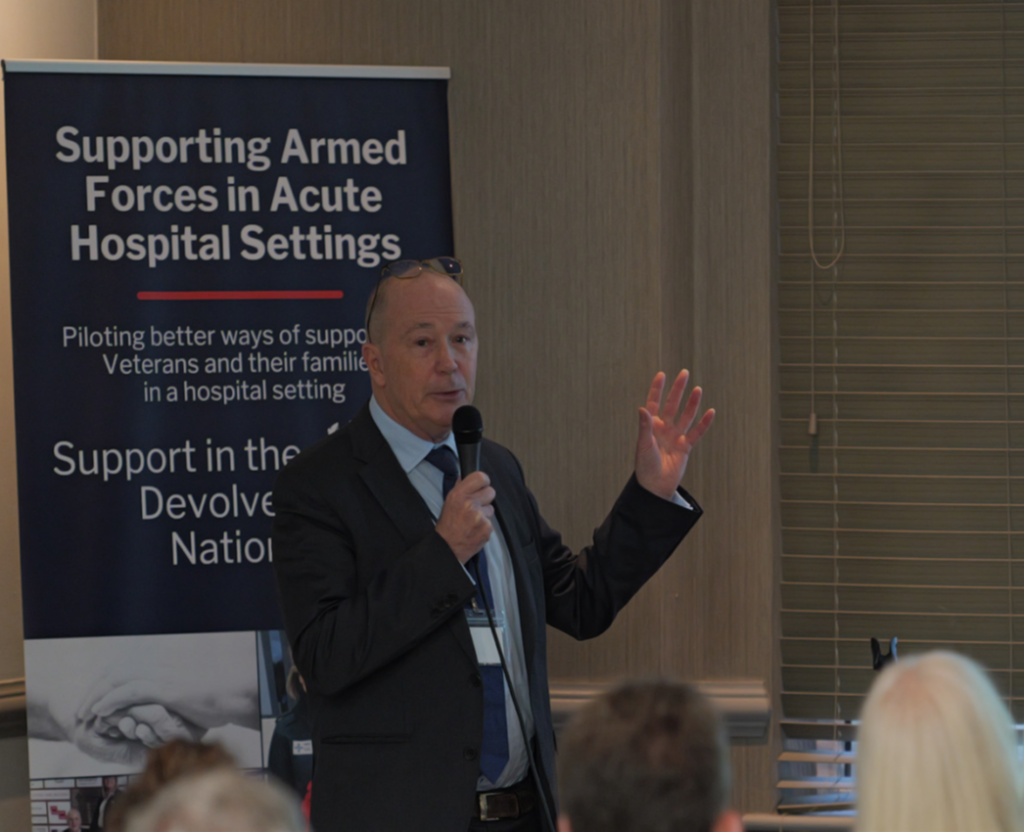
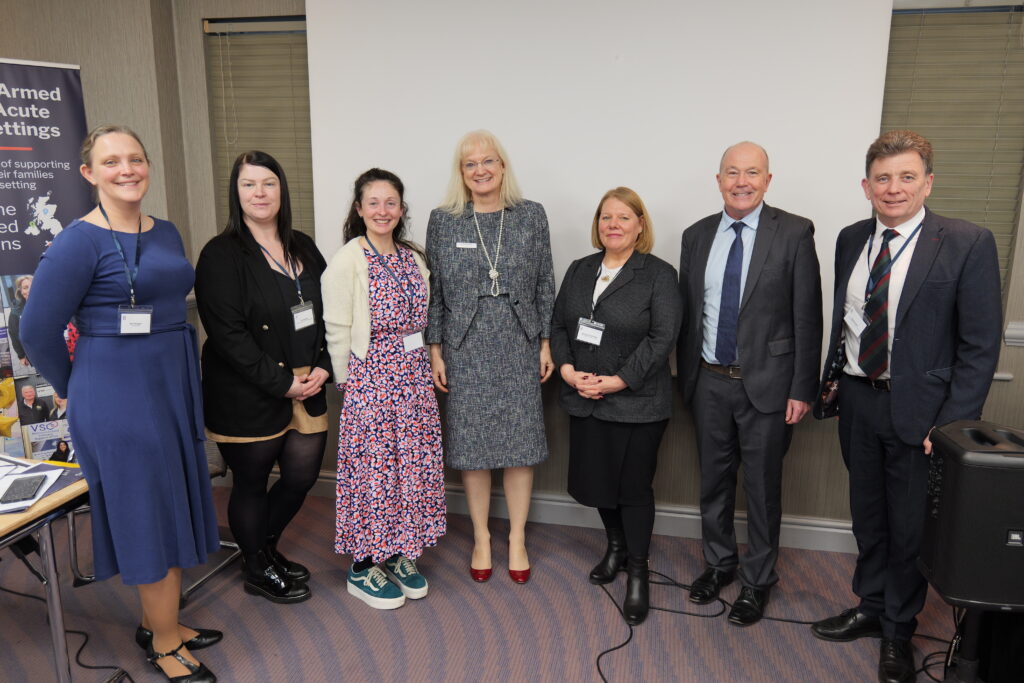
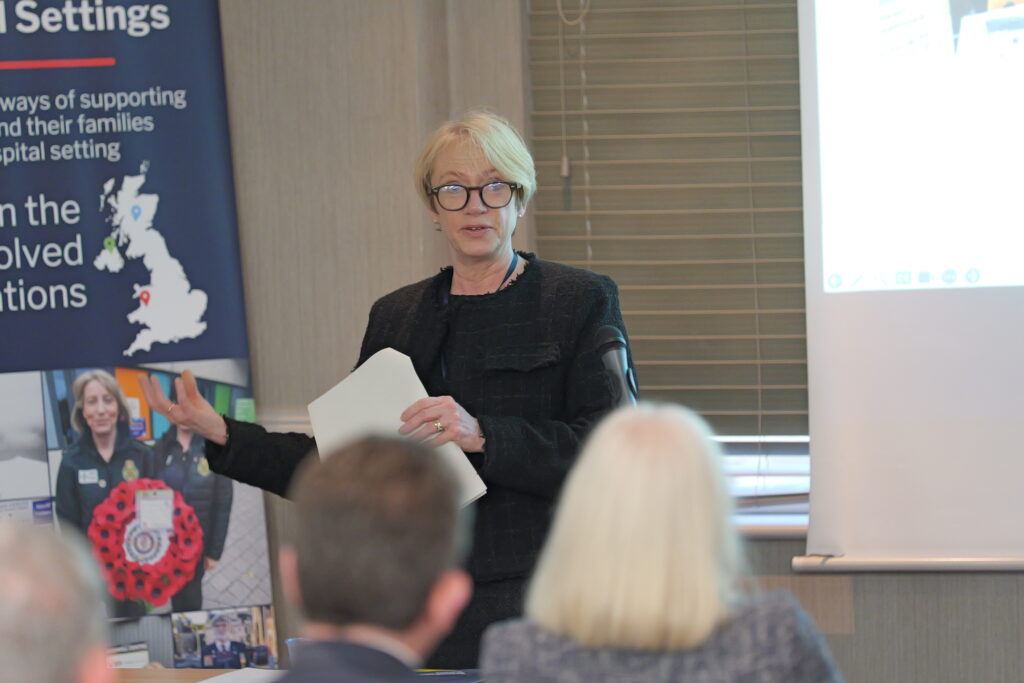
The Veterans’ Adviceline for Statutory Professionals (VASP) Service – a Northern Ireland signposting service, which offers assistance and advice with issues such as State Benefits, War Pensions, physical, mental and emotional health.
Read MoreFunded through the Supporting Armed Forces in Acute Hospital Settings programme, Betsi Cadwaladr University Health Board established the North Wales Veteran Healthcare Collaborative to improve NHS care for the Armed Forces community across North Wales.
Read MoreJames Paget University Hospitals NHS Foundation Trust focussed on supporting inpatients who are members of the Armed Service community, offering and sourcing additional support to those who need it on discharge.
Read MoreIn 2023/24, we have worked closely with the Office for Veterans’ Affairs (OVA) to deliver several funding programmes on their behalf. These programmes are Veteran focused and each link to the Government’s Veterans’ Strategy Action Plan 2022-2024.
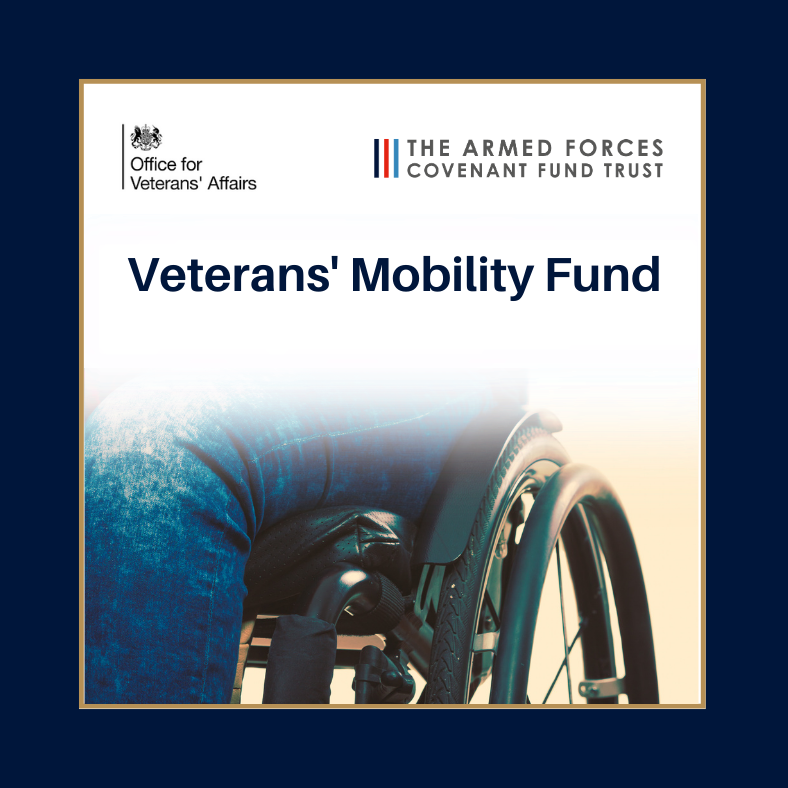
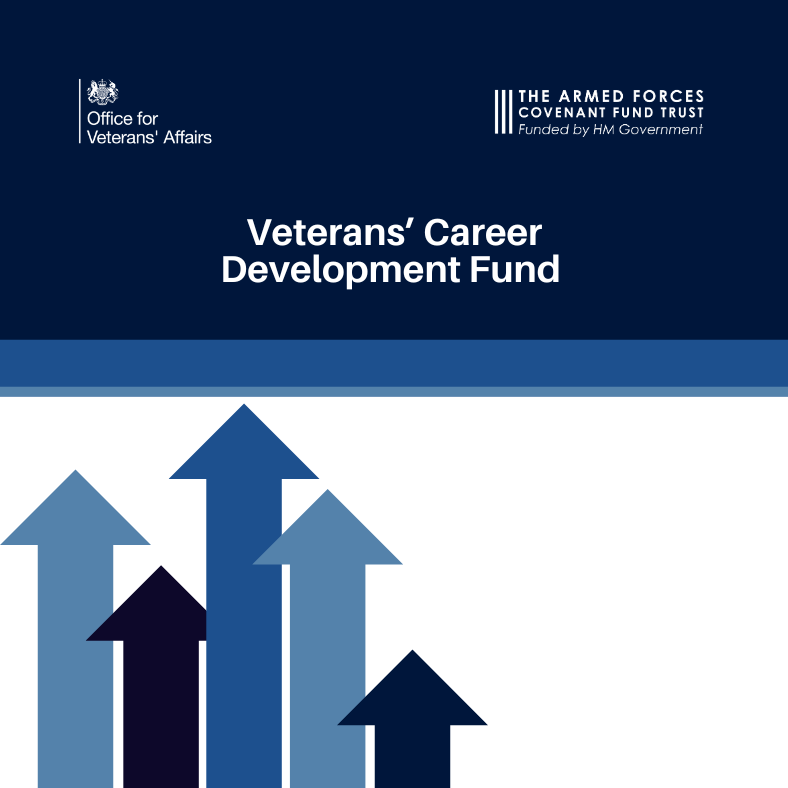
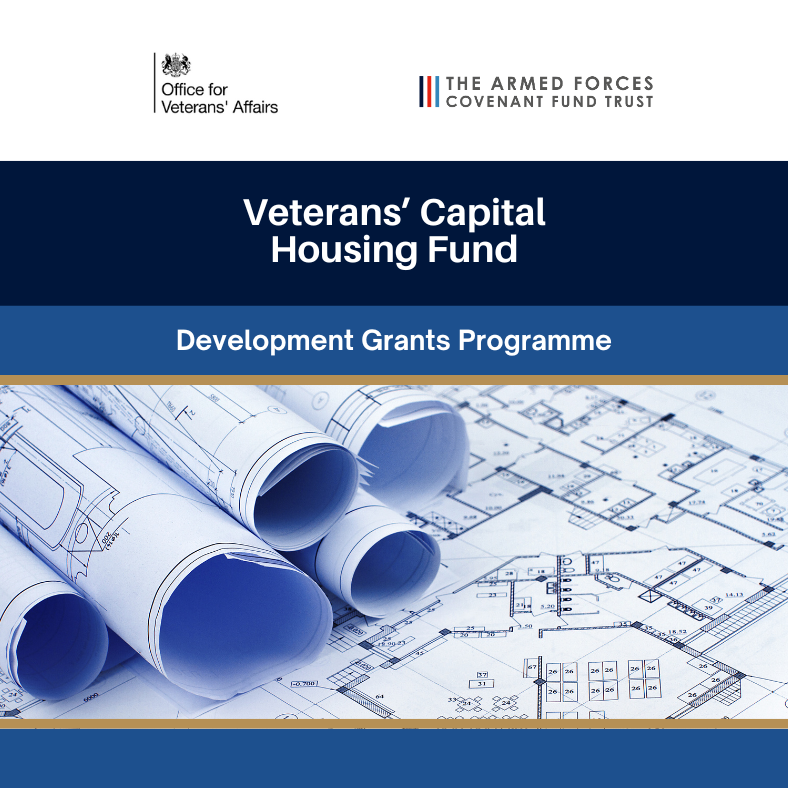
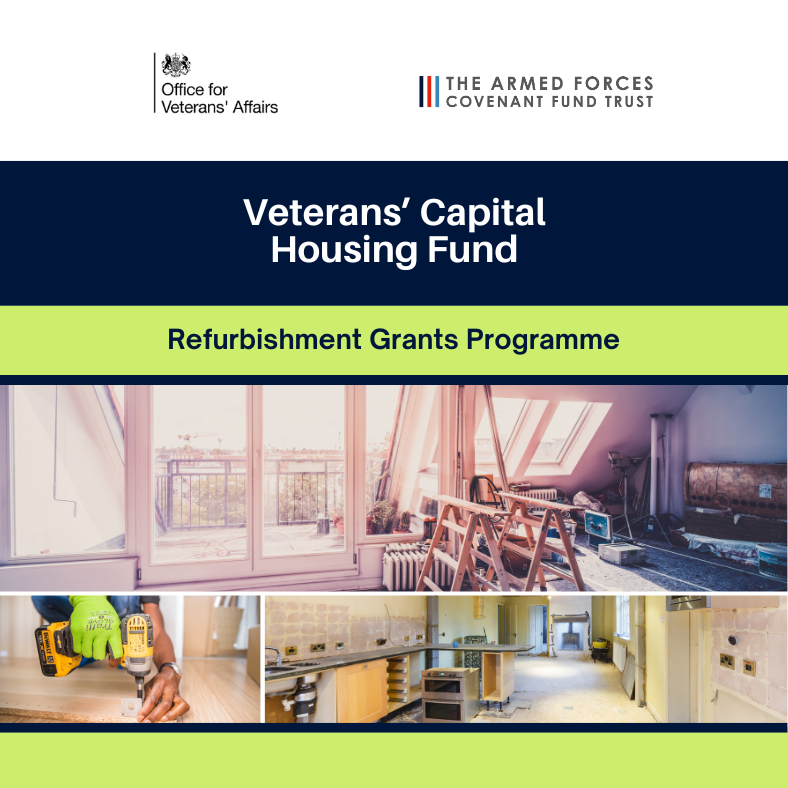
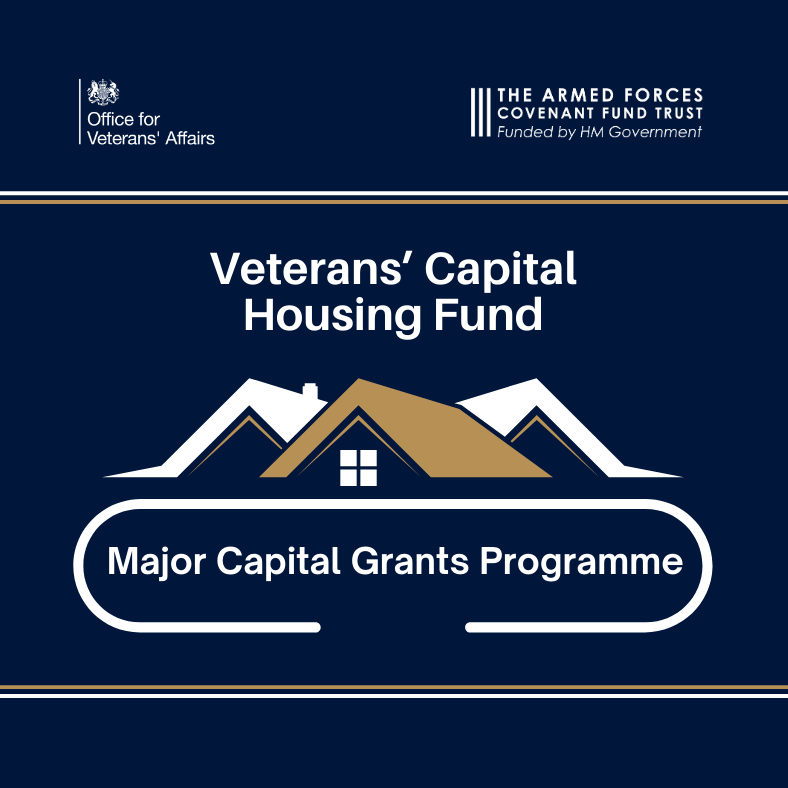
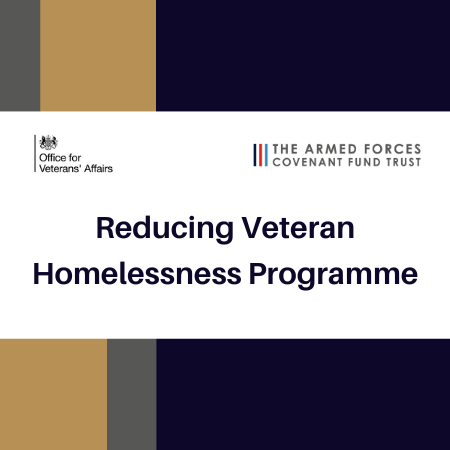

Introduced in July 2023, this fund supports mobility needs of Veterans, such as specialist wheelchairs and mobility scooters, which are not typically available through the NHS.
Following an open application process, we awarded a significant grant of £2.52 million to Help for Heroes, in partnership with BLESMA, to administer this programme over the next five years.

This strategic support underscores a deep commitment to recognising and addressing the unique needs of Veterans who have sustained serious injuries, ensuring they continue to lead fulfilling lives post-Service.
Help for Heroes announced the opening of the Veterans’ Mobility Fund, supporting Veterans in need of high-quality mobility equipment to improve their quality of life.
Read MoreLaunched in November 2023, the Veterans’ Career Development Fund aims to help Veterans and their families enter stable, long-term employment by providing grants of up to £70,000 over two years for training and qualifications. This program focuses on supporting Veterans facing barriers to employment, including women, LGBT Veterans, early Service leavers, and those from ethnic minority backgrounds.
This innovative Fund marks a pivotal advancement in supporting the transition of Service personnel into rewarding civilian careers and is designed to bridge the gap between military Service and civilian employment. With a robust focus on career development, the fund provides grants to organisations that offer training, qualifications and employment support tailored specifically for Veterans. This initiative recognises the unique skills and experiences of Veterans, while addressing the challenges they may face in the job market.
The Veterans’ Career Development Fund is more than just a financial resource; it’s a commitment to empowering Veterans as they embark on new career paths. By investing in the future of Veterans, the fund not only enhances individual lives but also contributes to the broader economy by harnessing the potential of this highly skilled workforce.
As this fund unfolds, it promises to transform the landscape of Veteran employment, making a significant, lasting impact on the lives of those who have served their country.
In March 2024, the Trust awarded grants to 11 inspiring projects. These projects included everything from bespoke training and career development to employability pathways and career coaching. While some projects focus on general training and employability skills, others present an opportunity to retrain in a specific field such as HGV driver training or teaching. For some, the focus is on developing skills gained from military Service, while others offer tailored support in transitioning to civilian roles.
In addition to these awards, we granted two larger awards in October 2023 to both Mission Community and the Forces Employment Charity. Both organisations will provide integral support to the Career Development Fund grant holders. Mission Community will provide sector initiative – helping to make the commercial case for employers to hire Veterans and harness their skills. The Forces Employment Charity will take an employment pathway approach – working directly with Veterans and their families, as well as employers, to identify and create clear routes to employment.
Together, these initiatives form part of OP PROSPER – a government backed scheme supporting Veterans into jobs where they can hone the skills that they developed in the military in key sectors that are helping to boost the economy. This includes areas like cyber and digital, manufacturing, energy and financial and professional services.
Veterans into Logistics provide life-skills and training which leads into stable, long-term employment in the logistics sector.
Read MoreThis funding was broken down into three separate grant programmes, each with multiple open grant application rounds.
Together, the three programmes not only address the immediate housing needs of Veterans but also contribute to their long-term stability. By focusing on both the creation of new facilities and the refurbishment of existing ones, the Capital Housing programmes ensure that Veterans have access to high quality, sustainable housing solutions.
As these programmes continue to roll out, their impact is expected to grow, reaching more Veterans and providing them with the foundations for a stable and secure future.
We launched the Major Capital Grants Programme this year, offering grants between £75,000 and £500,000 for significant refurbishment, extensions and new builds of rental accommodation for Veterans. This programme will support projects that create safe, effective, and modern living spaces, ensuring Veterans and their families can thrive in supportive communities.
These awards will be made as part of a two-stage process, with the first round of awards due in May 2024. The programme supports projects that contribute to the goal of ending Veterans’ homelessness and provides Veterans with high-quality support housing.
The Development Grants programme provided grants up to £25,000 for early-stage development costs of housing projects for Veterans. We supported six projects worth £147,356 to help cover professional support costs like architects and surveyors needed to develop detailed building plans and cost assessments.
The Refurbishment Grants programme awarded grants up to £75,000. This year we supported seven projects worth a total of £408,464. Dedicated to upgrading existing Veteran housing facilities, this programme awards grants for projects that refurbish and improve current accommodations. By providing more comfortable and suitable living conditions, these grants help maintain dignity and improve the quality of life for Veterans, allowing them to live independently in environments that support their wellbeing.
Royal British Legion Industries were awarded a grant for 73,750 under the Refurbishment Grant Programme to focus on family homes as part of a wider programme of repairs and renovations.
Read MoreFind out more about these programmes below:
In 2023/24, we awarded £7.2 million to nine projects under the Reducing Veteran Homelessness Programme – a targeted programme to tackle the issue of Veterans experiencing homelessness.
These projects not only offer housing, but also facilitate access to specialist medical care, community integration and employment tools, ensuring Veterans receive a holistic support system.
Under this programme, the Trust awarded grants on behalf of the Office for Veterans’ Affairs (OVA), towards projects that contribute to the aims of the government’s ambition to reduce Veteran homelessness and end rough sleeping.

A standout initiative – Op FORTITUDE – provides a £500,000 hotline operated by the Riverside Group, offering a single point of contact for homeless Veterans to access a network of support services, including housing, charity support and local authorities.
All nine projects are now equipped to handle referrals from Op FORTITUDE, expanding the network of housing providers and ensuring comprehensive support across the UK, including 650 homes in Scotland and a new consortium of housing in the northwest of England through Wigan Council.
Riverside’s project Ending Veteran Homelessness Together provides supported housing specifically for Veterans with high and complex needs, aiding a successful transition to civilian life.
Read MoreAlabaré were awarded £1,380,214 under the Reducing Veterans Homelessness programme in June 2023 for their project Homes for Veterans.
Read MoreVeterans Housing Scotland received £907,071 in June 2023 under the Reducing Veterans Homelessness Fund for their project Reducing Homelessness for Scottish Veterans.
Read MoreBeyond the Battlefield were awarded £100,000 in March 2024 to provide wrap-around services for Veterans in Northern Ireland who are homeless or at risk of homelessness.
Read MoreIn January 2022, the government published the ‘Veterans’ Strategy Action Plan: 2022 to 2024’, which committed to “… deliver an independent review into the impact of pre-2000 practices on LGBT Veterans”. To deliver this, Defence and the Office for Veterans’ Affairs co-commissioned the LGBT Veterans Independent Review, chaired by Lord Etherton, in 2022. The final report was published in July 2023.
Lord Etherton’s review examined the experience of LGBT Veterans affected by the pre-2000 ban on homosexuality in the Armed Forces. LGBT Veterans responded to the review and there was evidence of emerging and complex need within a vulnerable community.
The Trust responded rapidly to this emerging need, providing funding to organisations for capacity uplift within the sector to support those affected by this issue. We stipulated that support must be provided in a person-centred manner, including mental health and wellbeing support, loneliness and isolation and connecting Veterans to the right services to help with wider needs they may be experiencing.
We awarded a share of £137,000 to four organisations currently providing support to LGBT and other impacted Veterans. This funding was to enable them to rapidly upscale the support they were offering to provide additional short-term support in the wake of the report.
With guidance from the Office for Veterans’ Affairs, the Trust awarded funding to the following organisations.
The core focus of these grants was to ensure immediate access to support for Veterans, particularly for those who may not have previously reached out, and those with complex needs.
Reaching Veterans in their community In addition to these solicited bids, the Trust also invited the current Veterans’ Places, Pathways and People programme portfolio lead organisations to apply for a grant of up to £10,000 to increase their capacity to support Veterans from LGBT communities in the areas they operate. We stipulated that this work should build on the existing work already taking place within the VPPP portfolio but that this extra funding should enable extra resources, delivery or services which complement their usual delivery. Nine of the portfolio lead organisations received a share of £89,818.
This fund highlights the commitment to diversity and inclusion within the Veteran community by providing targeted support and ensuring all Veterans receive the respect and support, they deserve.
Forward Assist were awarded £25,000 for their project The Safe Zone, an initiative run in partnership with Salute Her UK. This has provided resource for a trauma-informed ‘safe haven’, empowering LGBT Veterans with the skills needed to have a positive quality of life.
Read MoreThe LGBT Foundation were awarded £25,000 for their project Operation Equality: Expanding our Support. The grant has enabled the LGBT Foundation’s Wellbeing Services to expand across the LGBT+ Armed Forces community, building wider peer networks and providing affirming spaces for service users.
Read MorePart of the Veterans’ Mental Health and Wellbeing Fund, in 2021 the One is Too Many programme awarded grants of up to £300,000 to two-year projects that sought to reduce suicide risks amongst vulnerable Veterans in a co-ordinated and targeted way.
Our ‘One Is Too Many’ Suicide Prevention Conference took place in October 2023, bringing together experts and stakeholders to address a critical issue: Veteran suicide prevention. The conference highlighted the significant strides made through the innovative funding programme backed by HM Treasury, which has been instrumental in reducing suicide risks among vulnerable Veterans.
Attendees heard first-hand from the One Is Too Many grant holders, who shared compelling updates on their projects across the UK. These initiatives have been pivotal in implementing coordinated and targeted strategies to mitigate suicide risks within the Veteran community.
The conference featured a detailed presentation by Professor Alan Finnegan and his team from Chester University, who shared the findings from an external evaluation of the programme. This research has provided valuable data, shaping future directions in Veteran mental health interventions. The illustration on the right shows the recommendations that came from the programme evaluation.
A further webinar, held on 20 March 2024, successfully unveiled leading research from The Baton and Northumbria University, focusing on bereaved military families and their crucial role in preventing Veteran suicide. This event showcased the compelling outcomes of a project funded with £299,000 from the One Is Too Many programme, emphasising co-production with families to create a safer environment for vulnerable Veterans.
The webinar not only facilitated a significant exchange of knowledge and experiences but also set the stage for ongoing improvements in the support systems for our Veterans, aiming to reduce suicide risks and enhance mental health understanding.
As the year drew to a close, so did the first phase of the Trust’s Veterans’ Places, Pathways and People programme, with this two-year programme and numerous projects concluding at the end of 2023 and early 2024.
This programme delivered significant improvements to how Veterans with mental health and wellbeing needs are supported, in a co-ordinated and joined-up way. Funding was given for the sustainable provision of places of safety and pathways of support across the UK, and to help ensure that the people who support Veterans can themselves access good quality training and support.
“VPPP provided an opportunity to bring together a range of different providers within the region to work towards a common goal.” (Portfolio partner)
The VPPP programme was delivered in 10 regional portfolios across the UK. Across the ten portfolios, there were 88 individual organisations funded by the programme, with 14 of these organisations involved in work in multiple regions, and each region having between seven and 19 funded partners.
Four Strategic Leads (ASDIC, Cobseo, Combat Stress and SSAFA) focused on specific themes and supported the programme at a national level. An important feature of the VPPP programme and what it aimed to achieve for Veterans is the broad definition of ‘mental health support’, and over £9 million was invested in a wide range of services and activities offered by grant holders and projects. These cover the full spectrum, from ‘banter and brew’ sessions to social prescribing, psychotherapy and suicide prevention.
“Through VPPP, it is proved that collaboration between different organisations makes a difference to the beneficiaries. Through the collaboration work, beneficiaries have been able to find help quicker.” (Survey respondent – portfolio partner)
The interim evaluation report, published in September 2023, revealed the challenges the programme aimed to address: from loneliness and isolation to complex PTSD; from dealing with day-to-day issues to affecting cultural and behavioural changes. The report primarily looked at the activities and achievements through the first year of the programme and into year two. It explored improvements to mental health support and services, greater connection with Veterans, improved cross-sector support for Veterans, how partnerships and collaborations have grown and developed, and how projects are embedding what they have learned into their ways of working.
“It is probably fair to say that the biggest achievement of the VPPP programme to date across the South-East has been the establishment of some very exciting and, in the longer term, important relationships and pathways – in partnership – that quite simply did not exist one year ago. Most importantly, we have seen the emergence of an understanding and a passionately held belief that partnerships are the way forward to creating a better support system for Veterans from all strands of the Armed Forces.” (Veterans’ Outreach Service, VPPP Southeast)
Beyond the period covered by the interim report, the evidence shows that the programme has continued to develop, and the projects within it have built on their successes in the first year – the final evaluation report on the programme is due to be published in Summer 2024.
More recent reporting by VPPP regional leads and grant holders, from year two of the programme, highlighted ongoing collaborations, cross-sector partnerships and improved referral processes. Training courses and learning activities for the people supporting Veterans directly continued through the second year of the programme, upskilling case workers and others involved in delivering services.
Veterans and their families have continued to experience improvements in their circumstances.
“[A portfolio member] has recently seen success with a hard-to-reach Veteran. It took time to build up a level of trust with him, but now he and his wife are regular visitors to [the centre] and take part in our social inclusion activities. One of the major issues was that they needed to move into a social housing bungalow for health reasons, which we assisted with by liaising with the housing association. They have now moved into their new bungalow and are very happy to have finally made the move, improving the quality of both their lives. Now that the housing issues are settled, they are feeling a lot more secure with their life, and we have encouraged the Veteran to access help for his mental health which has not been addressed for over thirty years.”
Thankfully, much of the great work and impact from the two years of the VPPP programme can continue!
In November 2023, the Trust was delighted to be awarded an additional £10 million for the VPPP programme, so portfolios can continue their impactful and collaborative projects, and build on the achievements of the first two years of the programme. This additional funding is to increase support to a significant community of vulnerable Veterans throughout the UK and enable that support to become self-sustaining.
To continue the momentum of the first phase of the programme, in March 2024, regional portfolio leads received interim funding to work with their wider portfolios and networks to deliver consultations and develop strategic plans to inform how the additional funding should be spent in each area.
We were keen to ensure that everyone who has an interest in this work could take part in the consultation process, and details of how to get involved were shared on the Trust’s website. Feedback from these consultations is shaping the delivery of the next phase of the VPPP programme, which will be staged over three years, from 2024 to 2027. Also shaping the programme are the findings from the final evaluation of phase one of the programme.
“Long-term impact is the collaborative working with those organisations linked through the programme, ensuring sustainable support is available to those in need.” (Portfolio partner)
Early findings from the VPPP evaluation show that the programme and the projects within it directly supported over 15,500 Veterans, with a further 37,000 indirect beneficiaries in the wider Armed Forces community receiving support, typically families and carers of Veterans.
62.6% of the respondents to a survey sent to all stakeholders in the VPPP programme said that the programme was either very effective or extremely effective – a further 15.9% agreed that the programme was quite effective.
Combat2Coffee are dedicated to improving the mental health and wellbeing for Veterans and their families. They are one of 11 funded partners in the East of England supported through the VPPP programme, who all work together to support Veterans in need in the region.
Read More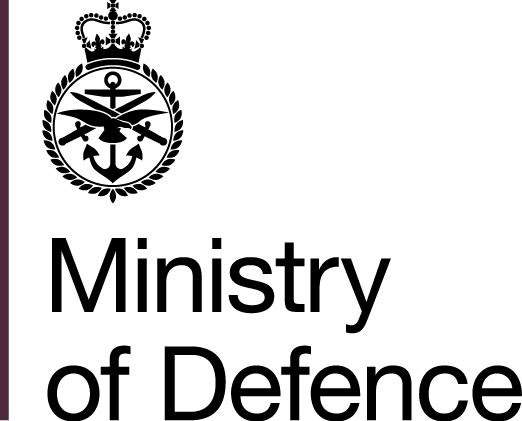
In alignment with the MOD’s Armed Forces Families Strategy, we’ve launched targeted grant programmes on behalf of the MOD to elevate the quality of life and opportunities for Armed Forces families. These initiatives focus on critical areas of need such as education, childcare and spousal support, ensuring comprehensive backing that aligns with the unique needs of military families.
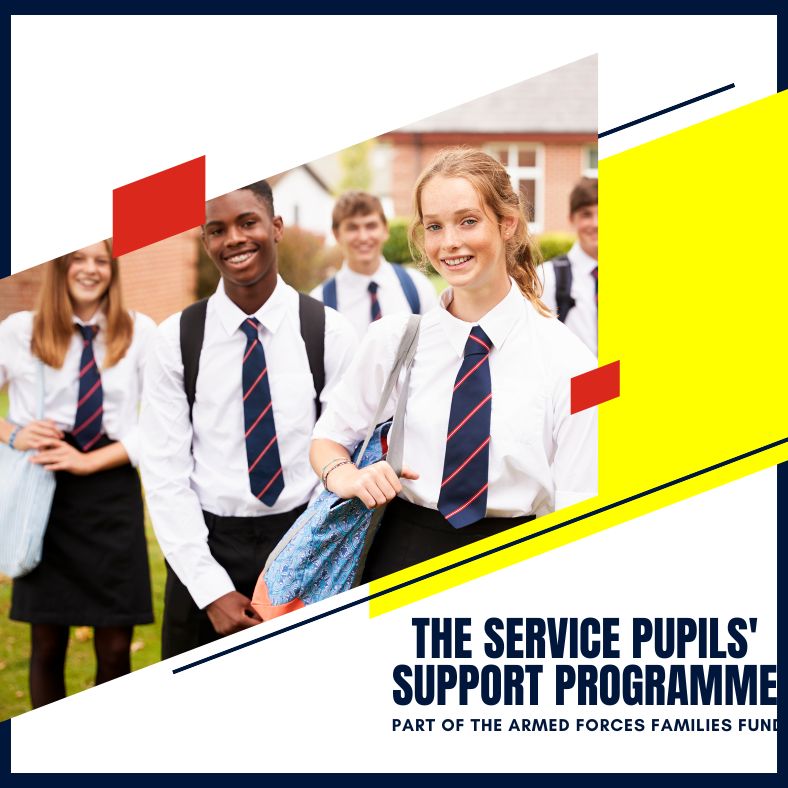
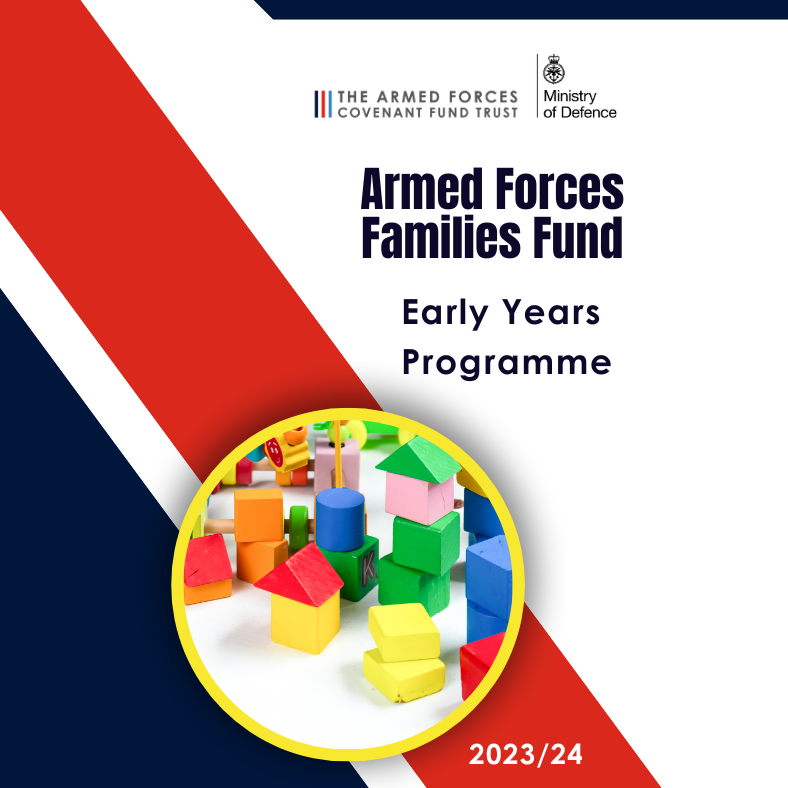
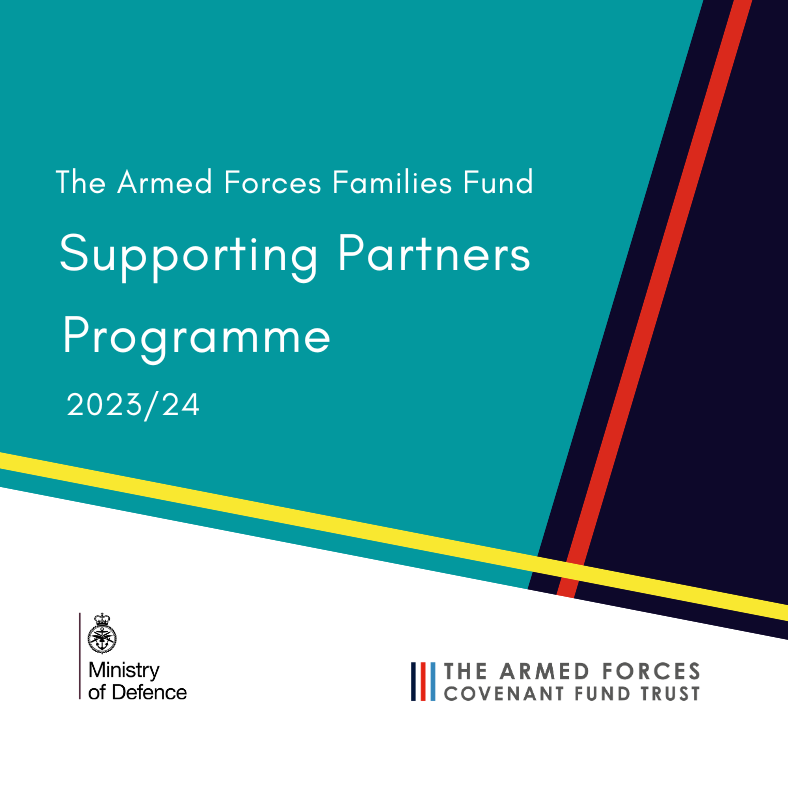
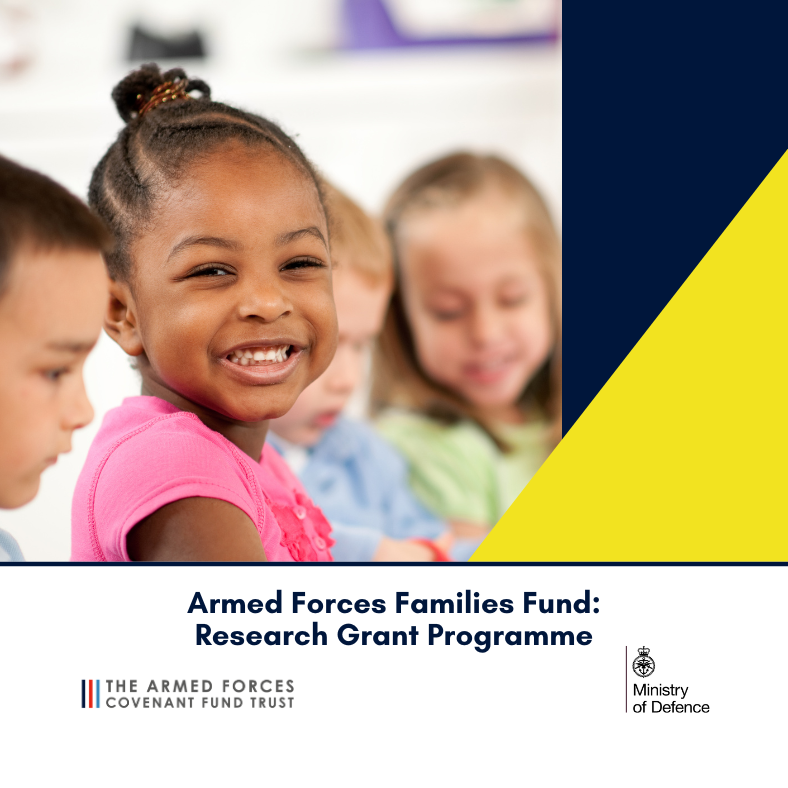
In 2023/24, we awarded over £1.8 million to 48 projects aimed at enhancing educational outcomes for Service children. These projects are dedicated to closing educational gaps and providing targeted support to pupils with additional needs, enhancing resilience and academic performance across the UK.
St Gerardine School were awarded £77,400 for their project, Additional Support Needs Targeted Intervention. It enables additional support to be delivered across a cluster of schools, resulting in early, targeted and child-centred interventions and support for Service children with additional support needs.
Read MoreThe Garrison ASSIST project (GAP) PLUS was awarded £80,000 to build on the highly successful Garrison ASSIST project, which is now established and generating interest from policymakers and strategic leaders alike.
Read MoreThis year we awarded more than £1.2 million to 31 projects that improve early childhood education and care for Service children aged 0-5 years. This funding boosts the capacity and quality of early years settings, making high quality childcare more accessible to Service families.
Sandling’s Playgroup in Woodbridge were awarded £36,125 under the Armed Forces Families Fund: Early Years programme to support the development and revamp of the playgroup’s outdoor space.
Read MoreCatterick Garrison Preschool, Yellow Ribbon, were awarded £12,700 through the Early Years programme to create new learning spaces for children and babies with additional needs.
Read MoreWe allocated nearly £1,000,000 to 14 projects that improve employment support for Service partners and spouses, helping them leverage their skills and experiences effectively in the workforce.
The RAF Association was awarded £337,000 under the Removing Barriers to Family Life programme to formally establish the Military Coworking Network (MCN) – a network of coworking hubs on or near to military bases, enabling members to access a strong, professional network.
Read MoreThe Overseas Employment Guide (The guide) was awarded £46,500 under the Supporting Partners Programme to help simplify these complexities by empowering families to make more informed decisions by establishing workable action plans.
Read MoreWith an investment of over £169,000, we supported three research projects aimed at unpacking the complex educational and welfare challenges faced by Armed Forces families, proposing actionable solutions to these pressing issues.
Each funded initiative is designed to respond to the evolving needs of military families, ensuring that our interventions are both impactful and sustainable.
Bath Spa University were awarded £49,729 for their project exploring the deployment-related wellbeing of three-to-four-year-old Service children in their pre-school year.
Read MoreOxford Brookes University were awarded £60,000 in November 2023 for their project Supporting ALL to thrive, a study to develop understanding of how the unique and often complex challenges associated with Service life can affect the educational opportunities, experiences and outcomes of children with Special Educational Needs and Disabilities (SEND).
Read MoreThe University of Chester received £59,894 for their project, ‘Service children’s transitions in education’. The project will investigate the educational risks and benefits associated with Service children’s transitions.
Read MoreThe Impact Hub is an easy-to-use internet-based tool which enables the collection of impact data directly from project beneficiaries. Projects are asked to use the Impact Hub to help the Trust measure impact across all its programmes in a consistent way. Over the last 12 months, the focus of the Trust has been the user journey, so we have continued to develop the Hub in such a way that aims to ensure as many grant holders as possible can use it easily and effectively.
The Trust funds a wide range of projects which support members of our Armed Forces community with very different needs. The Trust knows its grant holders are very much subject matter experts in their own areas when it comes to evaluating the impact of their projects, and the measures that each project uses to show that their interventions are working are not necessarily the same. Therefore, we ask our grant holders to use the Impact Hub in addition to their own evaluation activities to collect data against the wellbeing and demographic measures that the Trust has identified.
We have listened to feedback and continue to develop the Hub in a way that aims to ensure it is an intuitive, easy-to-use resource for our grant holders. We utilise a simple demographic survey asking about the beneficiary and their military service/connection, and additionally use the ONS4 Wellbeing Survey. This is a simple 4-question survey which measures wellbeing by asking respondents “how they are feeling” at that moment in time. We ask that grant holders deploy the survey at the beginning, and at the end of the beneficiary’s interaction with them to show the change in score.
We are delighted that use of the Impact Hub continues grow across our programmes. The Trust have a dedicated impact team to support grant holders in their use of the Impact Hub, and to provide appropriate guidance and training. As of 31 March 2024, we had 8,703 active beneficiaries across 550 projects registered on the Impact Hub:
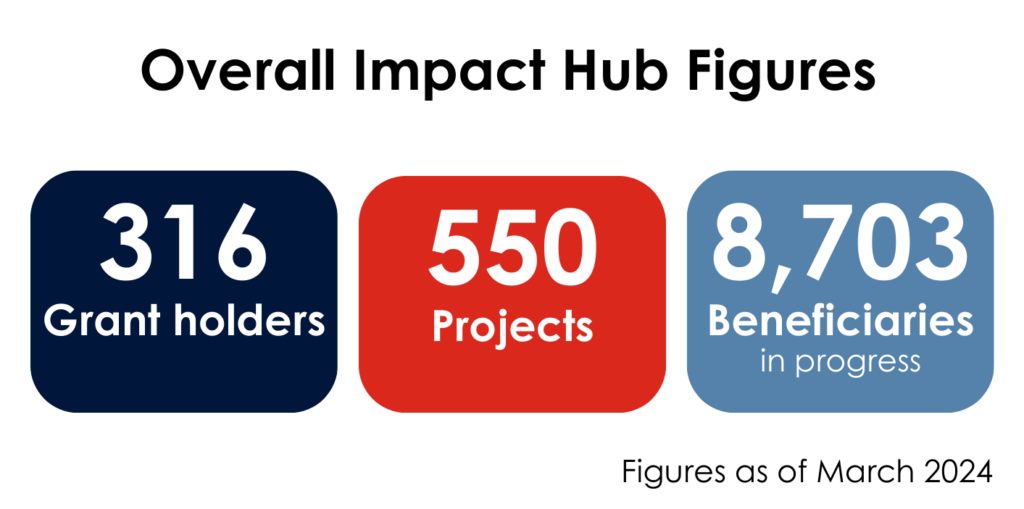
Over the last year the Trust have held a number of very successful impact and evaluation webinars for new grant awardees for both our Reaching and Supporting Armed Forces Communities and Transformational Grants programmes. The objective of these webinars was to introduce grant holders to our impact and evaluation activities, give information on why it is important to collect monitoring and evaluation data, and to give a high level overview of the Impact Hub. Grant holders who hadn’t used the Hub before were also provided with a live on-line demonstration of the Hub and introduced to the resources available to support their use of it.
In addition, the Trust have provided grant holders with additional tools to enable them to encourage beneficiaries to use the Hub, such as a letter to beneficiaries explaining why we are asking them to complete our surveys and giving reassurance about the safety and security of their data. We have received very positive feedback so far, and grant holders have told us it is an invaluable resource to enable them to help engage beneficiaries in impact and evaluation activities.
As of 31 March 2024, we had successfully onboarded two rounds of the Reaching and Supporting Armed Forces Communities programme onto the Impact Hub, and already have 725 beneficiaries in the system over 65 projects. Our third round of Reaching and Supporting Armed Forces Communities and second round of Transformational grants will be onboarded in early financial year 24/25.
You can find out more about our Impact Hub using the button below.
In 2023/24, the Trust published two key evaluation publications. We also commissioned two further evaluations. All are detailed below.
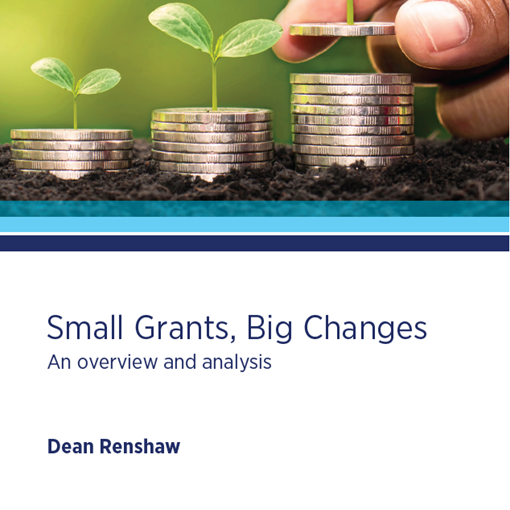
This report examines small grants and small grants programmes via a literature review and a survey of organisations that had received or applied for small grants.
Click for more on the Small Grants, Big Change report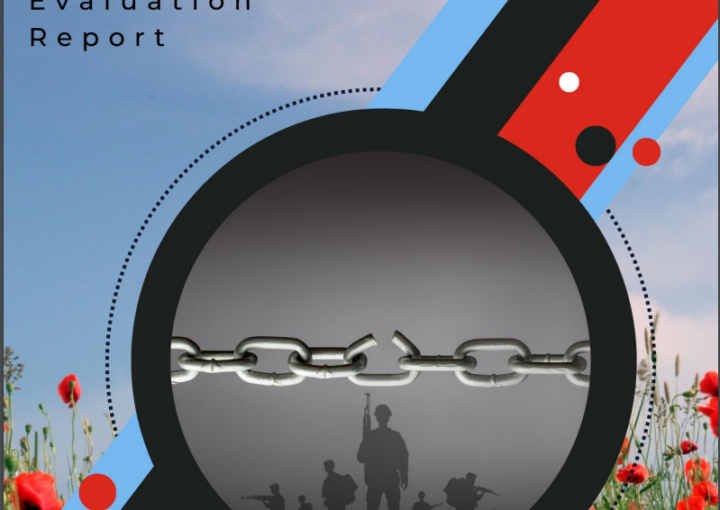
The OITM programme evaluation was carried out by the team at the University of Chester’s Westminster Centre for Research in Veterans.
Click to read the One Is Too Many programme evaluation
In November 2023, we commissioned Alma Economics, following an open tender process, to evaluate the Reducing Veteran Homelessness Programme (RVHP), which the Trust is delivering on
behalf of the Office for Veterans’ Affairs (OVA). The programme has awarded major grants to tackle the issue of Veterans experiencing homelessness and has funded organisations and projects that will contribute to the OVA’s ambition of ending Veteran homelessness and rough sleeping.
We launched the RVHP in April 2023. Grants were awarded in June 2023 to nine projects totalling £7.2 million. These nine projects will provide support to 1,300 vulnerable Veterans over two years across almost 60 housing complexes, ranging from apartment blocks to family homes. Homeless Veterans across the UK will be able to access specialist medical care, connections with local communities and the tools they need to gain employment.
Alma Economics are working on their mixed-methods evaluation over the next two years to understand how the RVHP has been implemented and the impact it has had on homelessness and other related outcomes. An economic evaluation will look at the social return on investment of the programme.

In December 2023, Edge Health began their evaluation of the Veterans’ Mobility Fund (VMF), which the Trust is also delivering on behalf of the OVA. The VMF awarded a single grant of £2.52 million to Help for Heroes to deliver high quality support to Veterans with physical disabilities. This funding will enable Help for Heroes, in partnership with Blesma, The Limbless Veterans, to deliver in-kind grants and equipment to Veterans across the UK, to help with their mobility needs.
Help for Heroes launched the mobility equipment support scheme in March 2024. Over the 5-year evaluation project, Edge Health will assess to what extent the mobility support scheme has met the overall aims of the VMF to enable Veterans to access high quality support, ensuring that proposed mobility equipment solution for the Veteran meets their needs, and enables them to engage in activities that are important to them and improve their quality of life.
The evaluation will examine how the scheme has been implemented, including the participation of Veterans and the wider Armed Forces community in co-designing the scheme. The research will also investigate value for money, including defining and calculating the social return on investment in the scheme, consider the cost and supply of mobility equipment, and the benefits provided by the equipment over those that would have been provided through the NHS.
The Covenant Fund has moved to a three-year funding cycle guided by our new Funding Framework. The Trust’s three-year Framework will build on the past themes and learning from Covenant programmes, the findings of the Consultation and broader research, including an in-depth literature review, to create programmes that support the delivery of the Nation’s Covenant promise to our Armed Forces, Veterans, and their families.
This has been a significant area of work for the Trust. Moving to a three-year cycle of funding delivery helps us to design and implement strategic funding programmes which will enable us to support effective outcomes for Armed Forces Communities, while also providing a clearer focus on where we will be investing our Funds.
Making these changes will also enable the Covenant Fund to work more closely with our stakeholders when we develop our strategic themes into programmes, to help us ascertain and help define the need, explore how to achieve the greatest impact and ensuring there is no duplication.
In developing our first strategic funding Framework, we ran a wide-ranging stakeholder consultation, having first considered themes under a literature review. In our literature review, we looked at published academic research on areas of need; published government strategies and we also looked at the learning that has come through evaluations of programmes which we have run in the past.
The Trust ran an open consultation in June and July 2023, to gather views from a wide range of stakeholders regarding the development of the Covenant Fund 3-year Framework, the shape of new programmes and to gather views on grants generally.
We devised the consultation to reach a broad cross-section of people and organisations from across the Armed Forces community.
540 respondents took part in the main consultation, which is the highest number of participants ever achieved by the Trust in a consultation exercise.
The consultation was vital in informing the direction of the three-year funding Framework. Drawing on the findings of the Trust’s consultation, the top three issues overall for people from Armed Forces
communities were:
The resulting Framework sets out the themes for delivery of the Covenant Fund between April 2024 to March 2027. These themes will be developed into comprehensive, outcome-focused programmes in each of the three years that this Framework will be delivered.
Over the next three years we’ll address the challenges and disadvantage faced by our serving and Veteran community and their families, while extending crucial support to those who’ve made sacrifices.
Our Framework has a strong focus on the principles within the Covenant of no disadvantage due to service and extra support for those who have given the most.
The Armed Forces Covenant is a promise by the nation that together we acknowledge and understand that those who serve or have served in the Armed Forces, and their families, should be treated with fairness and respect in the communities, economy, and society they serve with their lives.
Its two principles are that, recognising the unique obligations of, and sacrifices made by, the Armed Forces:
Our Funding Framework is ambitious and will be delivered over a three-year period with £10 million committed each year to projects and activities that support these themes, through funding programmes that specifically address each theme. We’ll collaborate with a range of stakeholders, potential beneficiaries and experts in the development of these programmes.
We will publish information every year on how we are delivering against our Framework.
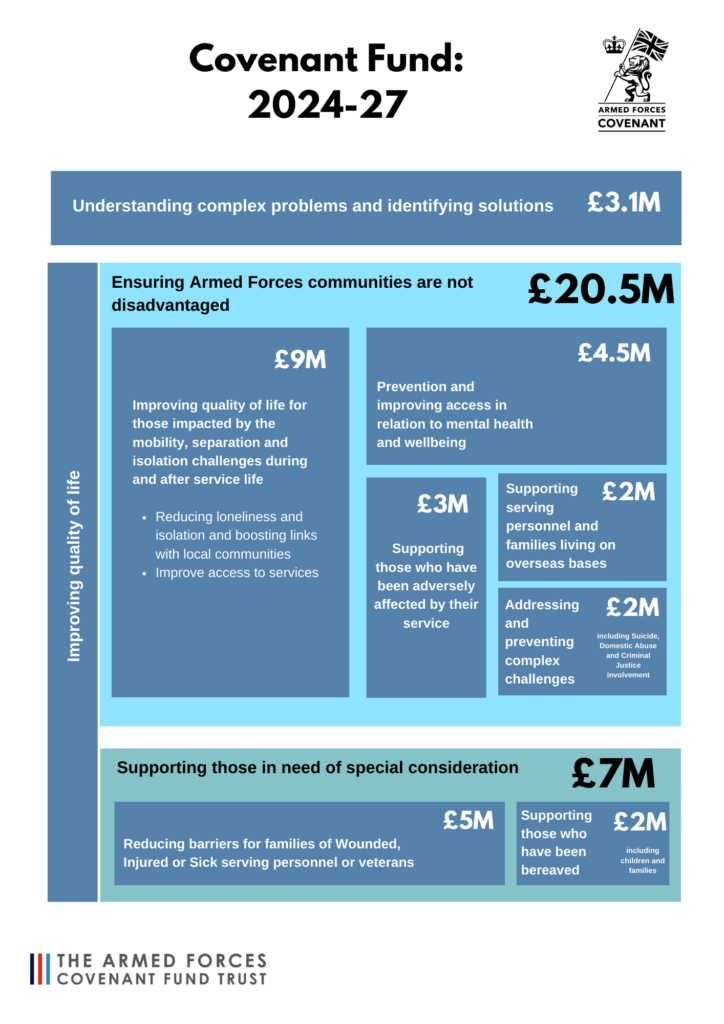
We will continue our detailed work with the MOD Children and Families team to deliver the Armed Forces Families Fund (AF3). The AF3 support projects that meet the aims of the Armed Forces Families Strategy.
In 2024/5 we will run programmes that:
We will deliver funding programmes to develop and refurbish more housing for Veterans. A particular area of focus will be a programme that will award grants of between £75,000 and £500,000 towards projects that support significant refurbishment, including extensions and new builds of rental accommodation that will offer high quality support for Veterans with a housing need.
We will manage a complex portfolio of grants awarded in the 2023/24 financial year to deliver effective outcomes for Veterans with physical disabilities, homeless Veterans and Veterans needing support with employment.
We will award significant grants to portfolios of projects, which will work regionally to develop better, more joined up lasting support for local Veterans with mental health needs, through the 2024-27 continuation programme.